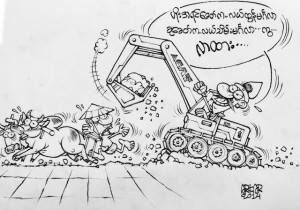Wealthy Burmese companies with political leverage, often financially backed by foreign investors, have been claiming farmlands around the country for development projects over the past two years, taking advantage of constitutional loopholes. But land rights issues have risen to the top of the political agenda in Burma as events and protests on the subject begin to capture front pages.
On DVB Debate’s panel: Maung Maung, general manager of Ayar Shwe Wah company; land rights activist Myo Thant; MP Aung Thein Lin; and former lawyer Myint Thwin.
Panellists discussed why so many victims of land grabbing have still not been compensated.
“In reality, when speaking about returning plots to farmers, there are some examples where these lands have still not been handed over,” said audience member Phoe Phyu, a legal consultant at Purple Equality law firm. “Even though the cases in question have been approved, the lands continue to remain seized and are being transformed into new land grab crimes.”

Aung Thein Lin, a member of the Parliamentary Land Grab Investigation Commission, which was set up to resolve land disputes, said that the original landowners often do not have the correct land documentation.
“It’s important to create policy for farmland,” he said. “Nowadays, there are many problems, such as who to return the land to. When we look at property documents, we frequently find only the names of the people who owned the land a long time ago.”
But Myint Thwin from the Food Security Working Group, said this was no excuse for not returning land, and those responsible should be held accountable.
“This issue must be resolved, and all citizens and farmers whose lands have been grabbed unlawfully should be able to sue the government, the military and the companies responsible,” he said.
Panellists disagreed about whether lands had been taken illegally. Audience member Myint Zaw, who is general manager for Zaykabar, a company known to have seized thousands of acres of land for development projects, said they have done everything by the book.
“Regarding the farmlands that we confiscated – we are using them, not abandoning them. So there is no reason to give them back. The documents we have are sufficient to prove ownership. Zaykabar got legal permission to keep the lands from the housing department,” he said.
Myint Thwin recognised there was a legal precedent for seizing land, but said the law was not being followed by the government or the army.
“There is a legal precedent which says that the land can be taken after a satisfactory amount of compensation is paid to the local owners,” he said. “Yet the army, the companies and the government do not follow this law. That’s why these problems occur.”
[related]
Aung Thein Lin said they are trying to resolve the issues, but there is still a long way to go.
“It is not possible to compensate everyone by the end of September, because some cases are still being reported to our committee as recently as yesterday,” he said.
Others believe these cases need to be prioritised.
“The current government and future governments should understand that the country cannot be governed well without solving the land disputes,” said Myo Thant, a farmers’ rights activist from the 88 Generation Peace and Open Society.
“It is a terrible situation for the country.”
The studio generally agreed that the laws surrounding these issues need to be clearer so they can be properly enforced, and that farmers need to be made aware of their rights and responsibilities.
You can join the debate and watch the full programme in Burmese at dvbdebate.com
Or share your views with us by commenting on our website at dvb.no


